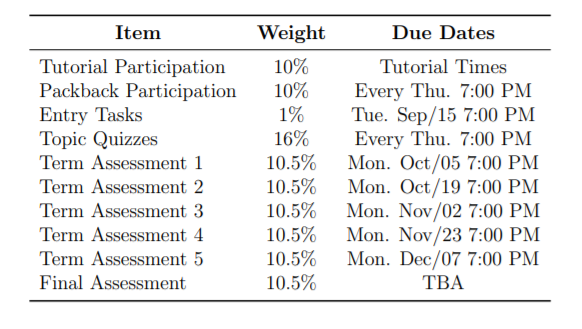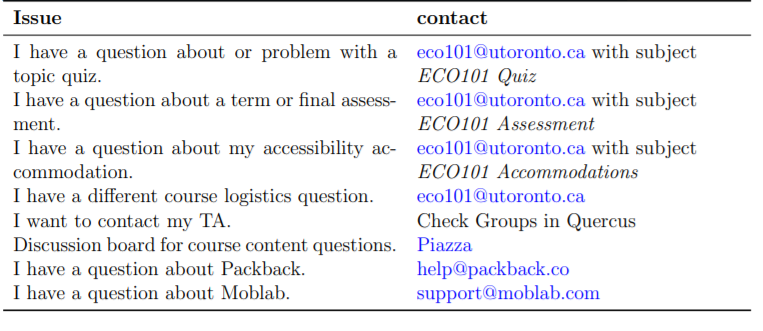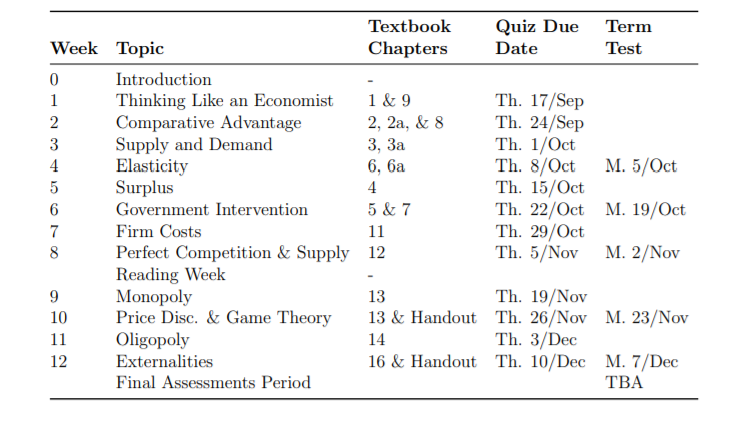
ECO101: Principles of Microeconomics
微观经济学代写 This course will be recorded on video and will be available to students in the course for viewing remotely and after each session.
Important: Please check your Quercus daily and configure regular notifications. Read the syllabus thoroughly, and enter important dates in your calendar. All times are ET (Eastern Time, Toronto’s time zone).
1 The Big Picture

1.1 Course Contacts 微观经济学代写
Always use your UofT email address, with ECO101 in the subject and your student ID number in the body. Clicking the link will fill in the required subject line

1.2 Learning Objectives
This course (ECO101) covers microeconomics, the study of decisions made by individual households and firms, and their allocative implications. Many of you will choose to continue to ECO102 (macroeconomics), which looks at a nation’s economy-wide phenomena such as the total size of an economy, unemployment, inflation, and the interaction between national economies. We have three primary learning objectives for this course.
- To introduce you to the economist way of thinking, and help you on the path towards thinking like an economist.
- Introduce you to and help you understand some of the canonical models of modern microeconomics. (This also entails understanding the limits of these models.)
- Assist you in gaining sufficient proficiency with these models so that you can apply them to novel situations and appreciate their implications vis-a-vis individual decision making and current public policy issues. 微观经济学代写
The emphasis of this course is on developing the ability to use economics to ask and answer questions. Using your knowledge to solve problems and ask & answer questions in new situations is valuable both in life and in the workforce. Employers will not ask you to solve problems you’ve seen before. Memorization will not help you develop these important job skills, and it is the easiest way to do badly in this course.
Deliberate practice (i.e., practicing the tasks you want to master) has been shown to be the most effective way to acquire new skills. We have structured this course to give you plenty of practice opportunities.
1.3 Required Materials 微观经济学代写
• Krugman, Wells, Au, and Parkinson, Microeconomics, Third Canadian Edition, 2018.
– Available in print or digitally through the UofT Bookstore. Full details on Quercus.
– Course outline assumes this version of the textbook. Other editions of Krugman & Wells are likely good substitutes. Full details on Quercus.
• Any handouts or videos posted on Quercus.
• Required: Packback https://www.packback.co (C$20. Registration instructions on Quercus.)
• Required: MobLab: https://www.moblab.com (US $10 Registration instructions on Quercus.)
1.4 Grading
Historically, the average grade in first-year economics is C+. The average grade in each section of Economics 101 will vary to reflect the relative performance of students in that section on the common part of the final examination. The average grade for a section whose students perform above average on the common component of the final examination will be higher than the overall average grade for Economics 101, and conversely. The average grade on each term test will, inevitably, vary across sections. However, it merits emphasis that students in a section where the average grade on a term test is low are not disadvantaged on this account. The average final grade awarded in each section of Economics 101 will reflect the performance of that student’s section on the common portion of the final examination. 微观经济学代写
2 Online Delivery Requirements
This course is online. Lectures are pre-recorded asynchronous, and tutorials are live synchronous. Each week we cover a new topic with multiple concepts. Each week, you should read the readings, watch the videos, take a quiz, participate in Packback discussion, and complete the assessments by the due dates. Because we believe that in-person interaction is an essential part of learning, we expect you to attend and participate in live tutorials. We will also have live Q&A, and office hour sessions. You should also regularly participate in online discussion groups manged
through Packback.
2.1 Time Zones 微观经济学代写
All times are in local Toronto time. If you are in a different time zone, please convert it into your time correctly. There are many freely available time-zoneconverters. Calculation errors are not an acceptable reason to miss deadlines.
2.2 Technical Difficulties
No accommodations will be made for late or missed work. This includes reasons for technical difficulty (hardware, software, or internet) or deadline confusion. Seriously.
We acknowledge that this policy is severe, but with over 2000 students, we have no choice. While severe, we do point out:
• Your lowest Tutorial, Packback, and topic quiz marks are dropped in calculating your final grade.
• Your one lowest term assessment mark is replaced by the mark on your final assessment if your final assessment mark is higher.
• For written Term Assessments, you can—and should—make multiple submissions during the time window. Only the last version of a question will be marked.
• For items marked by Quercus—topic quizzes, term assessment 2 and the final assessment—your responses are automatically saved as you progress through questions and you have the ability to return to previously submitted answers.
3 Diversity 微观经济学代写
Our Role: It is our intent that students from all backgrounds and perspectives be well served by this course. The diversity that students bring to this class is a strength and benefit. It is our intent to present materials and activities that are respectful of this diversity, including in the dimensions of race, culture, ethnicity and national origin, gender and gender identity, sexuality, socio-economic class, age, religion, and disability. Your suggestions are encouraged and appreciated.
Finally, we unfortunately do not have the ability to change names on the course roster. If you use a different name, please let us know so that we can use it whenever we can. You may also share your gender pronouns. Profs. Gazzale and Farhoodi both use he/him/his.
Your Role: The University of Toronto is committed to equity, human rights and respect for diversity. All members of the learning environment in this course should strive to create an atmosphere of mutual respect where all members of our community can express themselves, engage with each other, and respect one another’s differences. U of T does not condone discrimination or harassment against any persons or communities.
4 Course Structure
We have divided course content into twelve topics—one for each week in the term. Prof. Gazzale is the instructor for the first six topics. Prof. Farhoodi is the instructor for
the last six. In ECO101, the week ends on Thursday, 7:00 pm ET.
For each topic, you will find on Quercus:
• the required readings (textbook, some handouts); 微观经济学代写
• lecture videos;
• a ton of problems, almost all with solutions; and
• a topic quiz.
In addition, each week, you will participate in an online discussion board (Packback) and attend an online, synchronous tutorial. Finally, every two weeks or so, you will submit an assessment due Monday 7:00 pm ET.
4.1 Entry Tasks 微观经济学代写
There are a number of tasks you need to complete in order to be able to fully participate in this course. To earn 1% of course marks, please complete the entry tasks module on Quercus. The deadline for completing the module is Tuesday, 15-Sept at 7:00 PM, although some items are due at 7:00 AM. 4.2 Tutorials and Office Hours
• Purpose Review and discuss concepts from lecture, take up problems, and participate in tutorial exercises.
• Details Tutorials are mandatory. Active participation in tutorials is part of your participation grade.
• Marks I To receive credit for participation, you must submit an assignment duringthe specified time window.
• Marks II You should expect to earn an A from your sincere participation, with additional marks earned for particularly thoughtful submissions.
There will be approximately 28 different tutorial sections, with each section meeting at the same time each week—on Tuesday, Wednesday, or Thursday—for 50 minutes.
At the beginning of the term, you will have an opportunity to select a section—on a first-come, first-served basis—that matches your schedule. It is expected that you will attend the same tutorial section each week. If you attend a different section, we cannot guarantee that we will be able to record your participation, meaning we cannot guarantee that you will get marks for participation.
A Tutorial Document will be available on Quercus the Friday before each session. It is expected that you will have read the document—and completed any and all tasks and assignments— before the tutorial meeting.
Each Tutorial is led by two Teaching Assistants (TA). These are your TAs, and are your primary point of contact for the course. In addition to conducting tutorials, your Tutorial TAs will have weekly online office hours. While you are free to attend any office hours, we encourage you to attend the office hours hosted by your Tutorial TAs.
There will be additional office hours before each Term Assessment and the Final Assessment. The complete details are on Quercus. 微观经济学代写
4.3 Term Assessments & Final Assessment
• Purpose: Test your ability to think like an economist about everyday life questions.
• Detail I: We will release the questions few days prior to the due dates.
• Detail II: Term assessment 2 and “final assessment” are computer marked. The other four term assessments are human-graded writing assignments. We have chosen this format to help you develop your skills in both conducting an economic analysis of a situation and communicating your insights. Employers have reported that these are valuable skills.
• Where: All assessments will be accessible through Quercus. Assessments may require Crowdmark and Turnitin.com.
• Turnitin Statement: “Normally, students will be required to submit their course essays to Turnitin.com for a review of textual similarity and detection of possible plagiarism. In doing so, students will allow their essays to be included as source documents in the Turnitin.com reference database, where they will be used solely for the purpose of detecting plagiarism. The terms that apply to the University’s use of the Turnitin.com service are described on the Turnitin.com web site.”
• Marks: There will be a 20 percentage-point penalty for each minute of late submission. It is a good strategy to submit an almost ready assignment early and revise it before the deadline to avoid possible technical problems.
4.3.1 (Missed) Assessment Reweighting 微观经济学代写
• If the mark on your final assessment is higher than your lowest term-assessment mark, we will replace this lowest mark with your final-assessment mark when calculating your course grade.
• If you miss a term assessment, for whatever reason, you receive a 0 for that assessment.
• If you miss the regularly scheduled final assessment, the makeup will be an oral examination scheduled in accordance with Arts & Science guidelines and policies.
• Your final assessment mark can replace at most one term assessment mark. Let’s work through some of the implications of this policy.
• For the first term assessment you miss, there is no need to self-report any reason or illness. No documentation needed/accepted. Your mark for this assessment will be equal to the mark you earn on your final assessment.
• If you miss a subsequent term assessment, you may want to consider dropping the course as you will receive a zero for the assessment. In the case of extraordinary circumstances, contact your college’s Registrar’s Office. The only possibility of adjusting the marking policy would be the result of our consultation with your college’s Registrar. Seriously.
• We point out there is absolutely no benefit to missing term assessment, even if you are unable to adequately prepare for it.
• Further, missing a term assessment is risky as you do not know what the future holds. Assume that for whatever reason, you are going to be forced to miss the last
term assessment.
4.3.2 Requests for Remarking
• Remarking requests must be submitted using the Regrade Request Form available on Quercus. The form will be available for one week, starting from one week after the assessment has been returned to students. Requests will be accepted neither before nor after this form availability window. 微观经济学代写
• It is important that you clearly articulate why your response merits additional marks. Pointing to specific passages in either the textbook, lecture videos, or notes
in highly recommended.
• We will re-read your entire assessment. Your mark could go up, down, or remain unchanged.
• A calculation error does not constitute a Requests for Remarking. Contact your Tutorial TA in this case.
4.4 Topic Quizzes 微观经济学代写
• Purpose Both to make sure that you keep up with the material and to give you practice solving economics problems.
• Details Available on Quercus, due Thursdays, 7 PM. 4.5 Packback Participation
• Purpose Encourage participation, collaboration, and continuous learning.
• Details Participation is a requirement for this course, and the Packback Questions platform will be used for online discussion about class topics. Packback Questions is an online community where you can be fearlessly curious and ask open-ended questions to build on top of what we are covering in class and relate topics to real-world applications.
• Marking Each week, you must submit at least one critical thinking focused question and replies to two questions posed by your peers. To receive full marks, all must receive a Curiosity Score of at least 50 as defined on the Packback website. Posts earning a curiosity score of less than 50 receive half marks. We will drop your lowest scoring week in calculating your grade.
5 Getting Assistance
Instructor Office Hours Check Quercus for more details. TA Office Hours Each week, course TAs will hold drop-in online office hours. Hours and joining links are posted on Quercus.
• While free to attend the office hours of any TA, you are encouraged to attend the office hours hosted by your Tutorial TA team.
• There will be plenty of additional office hours before the assessments
Tutorials Always a good bet. 微观经济学代写
The Economics Study Centre Online this year, the Economics Study Centre is staffed by third and fourth-year undergraduate students (Learning Assistants) who assist students on a drop-in basis. Full details, including a join link, are available on Quercus.
Recongnized Study Groups (RSG) Small group collaboration has been shown to be an effective mode of studying. Recognized Study Groups are voluntary, peer-led study groups of 3– 6 students enrolled in the same course.
In addition to supporting students’ study habits and academic success, RSGs also encourage student participants to be socially connected with their peers. Participants earn a Co-Curricular Record (CCR) credit. Visit the RSG website (https://sidneysmithcommons.artsci. utoronto.ca/recognized-study-groups/) to find out more and join. Informal Study Groups If joining officially-sanctioned activities is not your thing, find some peers and form your own study group.
Piazza Piazza is an electronic discussion board through which students engage with each other by posting and responding to questions related to course materials. Piazza provides the opportunity for all students to become participants in class discussions. The discussions are regularly monitored by TAs and the instructor. You access Piazza through Quercus. Piazza—and not Packback—is the appropriate forum for posting questions about course content, administration, or economic ideas more generally. 微观经济学代写
6 Communication
Check your Quercus daily and make sure you are regularly notification of announcements and messages. The TAs and instructors will make important announcements in lectures and tutorials, on Quercus, or via email to the class.
Piazza, not email, is the appropriate forum for discussing course materials or asking questions about the course content. If it is a question that would interest other people (e.g., a question about an upcoming test, a course concept, etc.), Piazza is likely the appropriate forum.
As such, the use of email should be restricted to private matters. The table at the front of the syllabus identifies course email addresses for specific problems. Other issues should be directed to the Head TA (e.g., broken link, typo, etc.) or your Tutorial TA. Email must be sent from your University email address, and must include ECO101 in the header and your student number in the body.
If you must message either Prof. Farhoodi or Prof. Gazzale, please do so via the Quercus inbox (which does not require including ECO101 in the header). For emails or Quercus messages asking for a reply, if we can answer briefly without explaining course content or revealing something of general interest, then we will reply within three business days.
6.1 Online Etiquette 微观经济学代写
• Do not use your personal email for any course-related activity, registration, or communication.
• When sending any communication or participating in discussions, remember that there are real people with feelings on the receiving end. Be kind and treat people the way you would like to be treated.
• Respect the opinion of your classmates. If you respond to or disagree with your classmates’ arguments, do it respectfully and acknowledge the valid points of their arguments.
• In an online meeting (Tutorial, office hours), mute your microphone when you are not speaking.
7 Accommodations
7.1 Accessibility Accommodations
The University provides academic accommodations for students with disabilities in accordance with the terms of the Ontario Human Rights Code. This occurs through a collaborative process that acknowledges a collective obligation to develop an accessible learning environment that both meets the needs of students and preserves the essential academic requirements of the University’s courses and programs. Students with diverse learning styles and needs are welcome in this course. If you have a disability that may require accommodations, the first step is to contact AccessibilityServices.
7.2 Religious Accommodations
The University provides reasonable accommodation of the needs of students who observe religious holy days other than those already accommodated by ordinary scheduling and statutory holidays. You have a responsibility to alert us in a timely fashion to upcoming religious observances and anticipated absences that affect your ability to fully participate in this course. We will make every reasonable effort to avoid scheduling compulsory activities at these times.
8 Academic Integrity 微观经济学代写
The over-arching rule is simple. For any assessment or activity that counts towards your course grade:
• You may not receive assistance from another individual. This includes, but is in no way limited to, any online forum or other digital communication as well as any tutoring or assistance service.
• You may not give assistance to any individual enrolled in any section of ECO101.
For particular activities, we may relax this rule (e.g., group work in tutorials), and we may add additional restrictions. If you have questions or need clarification, ask.
Profs. Gazzale and Farhoodi take issues of academic integrity very seriously. In addition to harming your own development as a scholar, academic misconduct violates the trust placed in you by your peers, harms the academic community to which you belong, and ultimately lessens the value and prestige of a University of Toronto degree.
As such, we will report all suspected cases of academic misconduct to the Department of Economics and OSAI. The consequences can be severe.
Being unaware of the policies or what is considered unauthorized collaboration (e.g., plagiarism) is not a defense. If you have questions or concerns about what constitutes appropriate academic behavior, please reach out to one of the instructors. Please know that the University expects you to seek out additional information on academic integrity from me or from other institutional resources. The University’s Academic Integrity website is an excellent source of information. Further, it is a course requirement that you have read University’s Code of Behavior on Academic Matters, especially section B which outlines what are considered academic offences.
One of the entry tasks is to upload a hand-written and signed statement saying that you read and understand course and university academic-integrity policies and promise your adherence to them. This is a course requirement. We will not mark any of your assessments if you do not complete this requirement.
9 Copyright Policy 微观经济学代写
This course will be recorded on video and will be available to students in the course for viewing remotely and after each session.
Course videos and materials belong to your instructors, the University, and/or other sources depending on the specific facts of each situation and are protected by copyright. In this course, you are permitted to download session videos and materials for your own academic use, but you should not copy, share, or use them for any other purpose without the explicit permission of the instructor.
For questions about the recording and use of videos in which you appear, please contact your instructor.
10 Schedule
Prof. Gazzale covers the first topics, and Prof. Farhoodi covers the rest.






发表回复
要发表评论,您必须先登录。